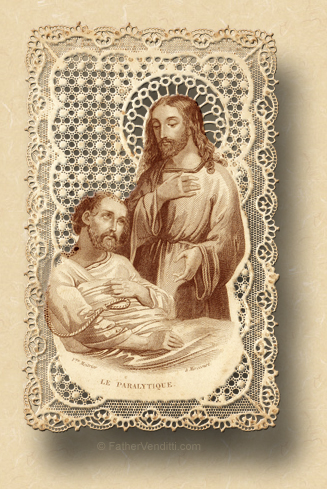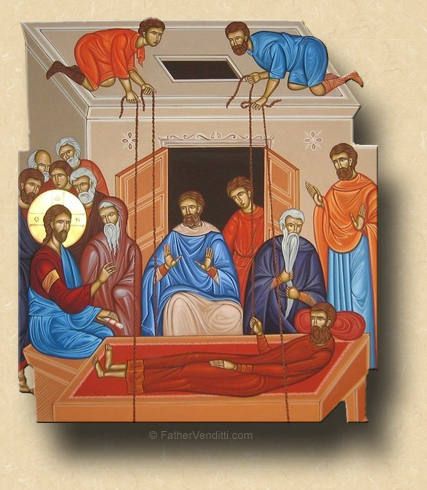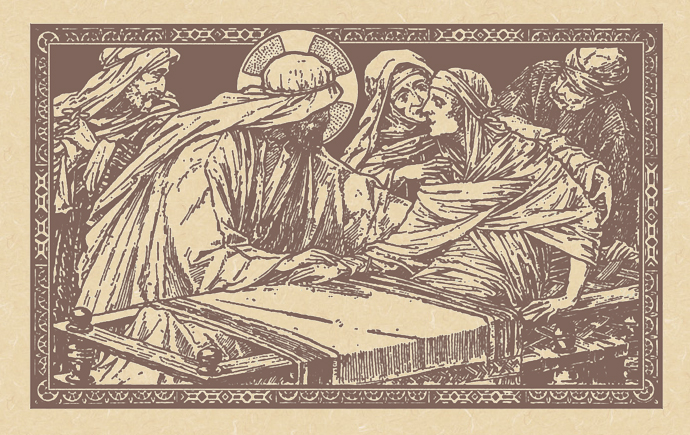Grace is Not a Free Ride.
The Second Monday of Advent.
Lessons from the feria, according to the ordinary form of the Roman Rite:
• Isaiah 35: 1-10.
• Psalm 85: 9-14.
• Luke 5: 17-26.
The Second Monday of Advent; and, the Commemoration of Saint Sabbas, Abbot.*
Lessons from the dominica,** according to the extraordinary form of the Roman Rite:
• Romans 15: 4-13.
• Psalm 49: 2-3, 5.
• Matthew 11: 2-10.
|
When a Mass for the commemoration is taken, lessons from the common "Os justi…" of Confessors for a Confessor not a Bishop:
• Ecclesiasticus 31: 8-11.
• Psalm 91: 13-14, 3.
• Luke 12: 35-40.
|
The Twenty-Ninth Monday after Pentecost, the Third of Philip's Fast; and, the Feast of Our Venerable and God-Bearing Father Sabbas the Consecrated.***
First & third lessons from the menaion for the saint, second & fourth from the pentecostarion, according to the Ruthenian recension of the Byzantine Rite:
• Galatians 5: 22—6: 2.
• Hebrews 8: 7-13.
• Matthew 11: 27-30.
• Luke 20: 27-44.
FatherVenditti.com
|
 10:29 AM 12/5/2016 — The paralyzed man in today's Gospel lesson has a lot to be thankful for, and not only the cure he receives from our Lord. He can be thankful, as well, for his friends who decided not to give up when they found they could not reach Jesus by the usual means. Taking him up onto the roof and lowering him down through the ceiling is certainly very unusual, and shows an extraordinary level of dedication and devotion, particularly since they’re doing it, not for themselves, but for someone else. And I suggest that their perseverance in taking such extreme measures to get their friend to our Lord is something that applies analogously to our own interior life and relationship with God. How many of us have given up or somehow faulted our Lord when we could not get what we wanted in the way we wanted? 10:29 AM 12/5/2016 — The paralyzed man in today's Gospel lesson has a lot to be thankful for, and not only the cure he receives from our Lord. He can be thankful, as well, for his friends who decided not to give up when they found they could not reach Jesus by the usual means. Taking him up onto the roof and lowering him down through the ceiling is certainly very unusual, and shows an extraordinary level of dedication and devotion, particularly since they’re doing it, not for themselves, but for someone else. And I suggest that their perseverance in taking such extreme measures to get their friend to our Lord is something that applies analogously to our own interior life and relationship with God. How many of us have given up or somehow faulted our Lord when we could not get what we wanted in the way we wanted?
Many years ago, when I was serving as a full-time hospital chaplain, I was often with families when they were told that a loved one had died. If the illness had been a long one, they usually had been praying for a recovery. And when death finally came, they inevitably felt that their prayers had gone unanswered, and this confused them. Why did God turn down their request? This is even more true when the death is sudden and unexpected, or when the person who has died was a son or a daughter; then the confusion often becomes a very bitter anger toward God: “I went to church every Sunday. I said my prayers. I lived a good life. I did what was right. Why has God let me down? Why has he betrayed me like this?” We've talked about this before.
And you will find within your own life that this is also true with regard to our own struggles with sin and temptation: “I have asked the Lord to help me with this sin. Why am I still struggling? Why is it that God does not lift this burden from my soul like I asked him to?” And when we go to the priest to confess the same old sin time and time again, we almost want to believe that it’s God’s fault: “I prayed for strength. Why has he not given it?” So many of us pray in the same way we shop: “O.K., here are my prayers, my Rosaries, my novenas, my First Saturdays, my sacrifices, my Masses—here’s my money—now give me what I want?” as if God’s answer to our prayers is like payment for services rendered.
And here is where I think the behavior of the paralyzed man’s friends can be instructive for us. When they reach the house where Jesus is preaching and find that there’s no way they can get in by the door, they could have stopped right there, had a little conference among themselves, and said, “What kind of nonsense is this? Here this guy invites us to come and bring our sick to be cured, and now we find we can’t even get in. We don’t have to stand for this.” And then I suppose they could have stormed in a huff cursing our Lord for not being accessible enough. But that wasn't the attitude they took; instead of cursing our Lord and turning away, they find another way.  And the way they find is certainly above and beyond the call of duty; it’s practically heroic. They climb up onto the roof, carrying their friend with them, and lower him through a hole the ceiling. It’s no wonder this impresses our Lord. And this is exactly why our Lord gives them what they came for: because instead of blaming Him, they looked for an answer within themselves and found a way to reach our Lord, never doubting the Lord’s love for them no matter what they had to go through to be with Him. And the way they find is certainly above and beyond the call of duty; it’s practically heroic. They climb up onto the roof, carrying their friend with them, and lower him through a hole the ceiling. It’s no wonder this impresses our Lord. And this is exactly why our Lord gives them what they came for: because instead of blaming Him, they looked for an answer within themselves and found a way to reach our Lord, never doubting the Lord’s love for them no matter what they had to go through to be with Him.
Now, I could end the homily right there, and simply say that the moral of the story is “God helps those who help themselves,” which would leave it on the level of a fourth grade Sunday School class; but, as you should know by now, there's always more to it than that. What these men do for their friend, and how our Lord responds to them, is a perfect illustration of what we've talked about here so many times: the Dogma of Sufficient Grace. You've heard it because I keep talking about it; but, any other Catholic you meet on the street is going to have no idea what you mean by it in spite of the fact that understanding it makes the whole spectrum of Catholic moral teaching comprehensible. The Dogma of Sufficient Grace basically is this: in any situation in which a baptized Christian is faced with a moral choice, the Holy Spirit will always provide sufficient grace to do what is right. More often than not, that grace will come through the Sacraments of the Church, but not always.
All it's really saying is that there can never be such thing as “I know the Church teaches this is wrong, but I really have no choice, otherwise this will happen or that will happen, and I just can't deal with that; so, I'm forced to do this thing I know is wrong.” The Dogma of Sufficient Grace says that this can never be true; and, if you think it's true, it's all in your head, the operative word in the definition being “sufficient.” It's not the Dogma of Abundant Grace; it's the Dogma of Sufficient Grace. The word “sufficient” implies just enough to do what's right; no more, no less. If it was the Dogma of Abundant Grace, then it would mean that God gives us enough grace to do what's right without any ill effects, without any hardship, without any suffering; but, because the grace offered to us is only sufficient, it does not protect us from suffering or hardship, but it does gives us the grace to cope with and endure the suffering and hardship that may result from doing the right thing.
We always have the ability, given to us by God, to do what is right, not only in extreme cases like a woman facing an unwanted pregnancy for example, but dozens of times every day, in all kinds of little situations, whenever we are faced with a choice to do right or wrong, and an easy way out always presents itself. In the case of the men described in today's Gospel, the easy choice would have been to say, “Well, we can't get in through the front door. We've done enough. No one could reasonably expect us to do more. Let's take our crippled friend and go home.” But they didn't do that. And who would've expected them to drag this man on his stretcher up onto the roof, and pull off the tiles, and lower him down through the ceiling? No reasonable person on earth would have expected that. Our Lord may have expected it in His Divine Knowledge, but in His purely human intuition He marveled at it, and gave them the grace of a cure for their friend.

* Sabbas organized monastic communities in Palestine and was famous for his virtues and austerities. He died in 531.
** In the extraordinary form, on the ferias of Advent, the lessons are repeated from the previous Sunday unless displaced by a feast or an Ember Day.
*** Cf. the first paragraph of the first footnote attached to the post here for an explanation of Philip's Fast. Today is the third Monday because the season began on a Tuesday.
|

